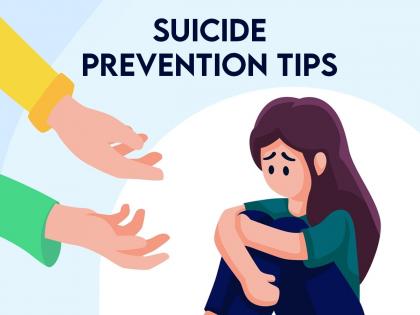Suicide Prevention: Warning Signs and Awareness Tips Amid Rising Cases in India Linked to Work Pressure and Stress
By Lokmat English Desk | Updated: October 3, 2024 13:22 IST2024-10-03T13:22:08+5:302024-10-03T13:22:42+5:30
Losing a loved one to suicide is not only a tragic event but also an incredibly painful experience, often ...

Suicide Prevention: Warning Signs and Awareness Tips Amid Rising Cases in India Linked to Work Pressure and Stress
Losing a loved one to suicide is not only a tragic event but also an incredibly painful experience, often leaving survivors grappling with a mix of emotions, including sadness, guilt, shame, and anger over their inability to help. Worldwide, over 720,000 people die by suicide each year, making it the third leading cause of death among people aged 15 to 29. If you know someone who is struggling with suicidal thoughts, it can be both overwhelming and frightening; however, your support can have a significant impact. Here are five ways to assist someone who may be contemplating suicide.
India holds the unfortunate record for the highest number of suicides globally. A report from the National Crime Records Bureau (NCRB) published in April indicates that 171,000 individuals took their own lives in 2022. The suicide rate has risen to 12.4 per 100,000, marking the highest rate ever documented in the country. Suicide has become the most significant public health crisis affecting people of all ages in India. In today’s fast-paced work environment, the pressure to excel and fulfill expectations can greatly impact both mental and physical health. Many individuals become trapped in a cycle of stress, burnout, and fatigue, frequently ignoring the signs that their job is negatively affecting their well-being. In a recent incident, a 52-year-old businessman took his life by jumping from Mumbai's Atal Setu on Wednesday. Additionally, Sushant Chakraborty, a 40-year-old Deputy Manager at a bank, also committed suicide by jumping into the sea after parking his car on Atal Setu on Monday.
Signs of Suicide
Recognizing the signs of someone contemplating suicide is crucial. Here are key indicators to watch for:
- Verbal Expressions: Discussing feelings of not wanting to be here anymore or mentioning death, particularly if accompanied by a specific plan for suicide.
- Distribution of Belongings: Giving away cherished items or possessions may indicate a sense of finality.
- Social Withdrawal: Isolating or distancing oneself from friends and family can be a sign of distress.
- Feelings of Burden: Expressing thoughts about being a burden to others often reflects deep-seated emotional pain.
- Despair and Hopelessness: Talking about feeling empty, hopeless, or lacking a reason to live is a serious red flag.
- Agitation: Displaying signs of anxiety or agitation may also indicate underlying struggles.
Also Read| Mumbai Businessman Jumps from Atal Setu in Tragic Incident; Days After Banker's Suicide.
Risk Factors for Suicide
Understanding the risk factors associated with suicide can help in prevention. Key risk factors include:
- Previous Suicide Attempts: A history of prior attempts significantly increases the risk.
- Mental Health Issues: Undiagnosed or untreated mental illnesses can contribute to suicidal thoughts and actions.
- Recent Loss: Experiencing a significant or traumatic loss can trigger suicidal ideation.
Protective Factors Against Suicide
Conversely, certain protective factors can mitigate the risk of suicide:
- Therapeutic Support: Actively seeking help from a therapist or counselor can provide essential guidance and coping strategies.
- Strong Relationships: Maintaining a strong connection with family, friends, and community support can foster resilience.
- Ongoing Medical Support: Having consistent relationships with medical and mental health providers offers crucial support.
Also Read| 10 Signs Your Job Might Be Affecting Your Mental and Physical Health.
Ways to Support Someone Experiencing Suicidal Thoughts:
Listen Without Judgment
Listening with compassion and without judgment is crucial for someone in distress. Providing a safe space for them to share their feelings can help them feel heard and understood.
Encourage Professional Help
While your support is vital, professional guidance is equally important. Encourage them to seek help from a therapist, counselor, or doctor. Remind them of available resources, such as the National Suicide Prevention Lifeline and Crisis Text Line, which offer 24/7 support.
Also Read| 10 Signs Your Job Might Be Affecting Your Mental and Physical Health.
Stay Connected and Follow Up
Isolation can intensify suicidal thoughts. Regularly checking in through texts, calls, or visits reinforces that they are not alone and that someone cares.
Remove Access to Harmful Means
To reduce immediate risk, it’s essential to limit access to dangerous tools or methods. Removing items such as weapons, medications, or sharp objects can help protect them in a crisis.
Suicide is preventable. Engaging in mental health services, understanding your family history of mental illness, and practicing self-care are vital steps in prevention. Recognizing the signs and risk factors, as well as knowing when to intervene, can save lives—whether it's your own or someone else's.
If You or Someone You Know Needs Help, Call Any of These Helplines:
Tele Manas (Ministry of Health) – 14416 or 1800 891 4416, NIMHANS – 91 80 26995000 /5100 /5200 /5300 /5400, Aasra (Mumbai) 022-27546669, Sneha (Chennai) 044-24640050, Sumaitri (Delhi) 011-23389090, Cooj (Goa) 0832- 2252525, Jeevan (Jamshedpur) 065-76453841, Pratheeksha (Kochi) 048-42448830, Maithri (Kochi) 0484-2540530, Roshni (Hyderabad) 040-66202000, Lifeline 033-64643267 (Kolkata).